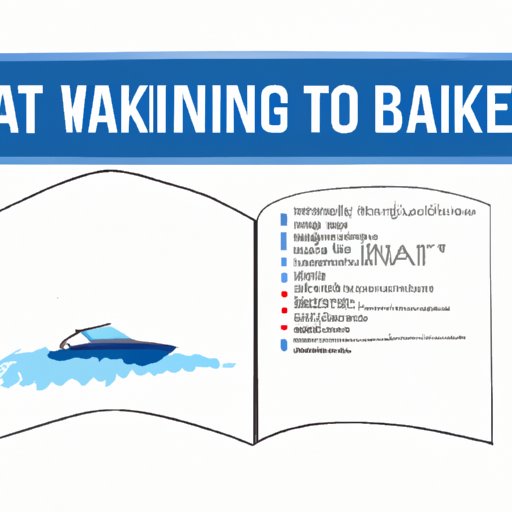Do You Need a License to Drive a Boat?
For many, boating is a fun and enjoyable way to spend time with family and friends. However, do you need a license to drive a boat? In this article, we explore this question and provide you with everything you need to know about boating licenses, regulations, and more.
Navigating the Seas: Understanding Boating Licenses
Before we dive into whether you need a license to drive a boat, let’s first define what a boating license is. A boating license, also known as a boater education card, is a document that certifies that a boat operator has completed an approved boating safety course.
There are different types of boating licenses, depending on the type of watercraft used and its horsepower. For instance, some states mandate licensing for boats with engines exceeding a certain horsepower or length. Other states require a license only if a boat operator is younger than 18 years old.
So where did the idea of boating licenses come from? The history of boating licenses can be traced back to the early 20th century when states started establishing their own laws to regulate boat safety. Nowadays, boating licenses are regulated by the United States Coast Guard (USCG) or state-specific regulatory agencies.

Taking to the Water: A Guide to Boating Regulations
If you’re planning to take your boat out on the water, it’s vital to be aware of the regulations that govern boating. Boating regulations are numerous, covering everything from safety equipment requirements to the use of personal watercraft.
Boating regulations can be divided into two main categories: federal and state regulations. Federal boating regulations are overseen by the USCG, while state regulations are supervised by a state-specific regulatory agency. Essentially, the requirements you’ll need to follow depend on which body oversees the waterway you’ll be using.
Some common federal regulations include requirements for life jackets and other safety equipment. Some state regulations include speed limits, noise restrictions, and restrictions on hunting or fishing. It’s essential to understand and follow these regulations, as they help ensure safety on the water.
Boating 101: Everything You Need to Know About Licenses
If you’re interested in obtaining a boating license, there are a few things you need to know. To begin with, there are certain eligibility requirements that must be met before you can take a boating safety course. For example, some states only offer courses for those who are over 16 years old.
Once you’ve met all the eligibility requirements, you can begin the application process for a boating license. This typically involves completing an approved boating safety course and passing a written or practical test. Courses can be taken either online or in-person.
Testing procedures vary by state, but typically, they include answering a series of questions related to nautical terms, safety rules, and navigational aids. Once you’ve passed the test, you can expect to pay a licensing fee that varies depending on the state or agency overseeing your waterway.
Boat Smart: The Importance of Licensing and Safety
The benefits of obtaining a boating license go beyond simply being able to operate a vessel legally. One of the most significant advantages is that it increases safety on the water. A proper understanding of boating safety rules and regulations helps reduce accidents, minimize damage to boats, and enhance safety for everyone on board.
Boating licenses are also essential for those who are considering renting or leasing a boat since many rental companies require a boating license to operate a watercraft. Besides, it’s worth noting that having a boating license can help reduce insurance premiums, which can save you money in the long run.
License to Boat: What You Need to Know to Hit the Water
Before setting out on the water, it’s vital to be well-prepared. There are many resources available to help you improve your boat handling skills, from taking additional boating safety courses to practicing basic maneuvers such as docking.
Boating safety courses can be found online, through state regulatory agencies, or via private organizations. Depending on the course provider, you may have the option to take the test online or in-person.
Practice activities such as practicing docking, anchoring, and navigating should be undertaken before taking your boat out on the water. These skills will help you feel more confident when operating a vessel and, as a result, keep you and your passengers safe.
The Legalities of Boating: Understanding License Requirements
Boating license requirements differ from state to state. For example, in Alaska, any person born after January 1, 1986, must have completed a state-approved boating safety course and possess a boater education card to operate a boat with a motor of 10 horsepower or greater.
In New York, the state requires drivers of motorized boats that are over 25 horsepower to hold a safe boating certificate, regardless of the operator’s age. In California, all persons under 16 years of age must have a boating license to operate any power-driven vessel.
It’s important to understand the boating license requirements specific to your state, as they vary from state to state. Additionally, some states or regulatory agencies might have additional requirements for specific types of watercraft, so it’s crucial to do your research before heading out on the water.
Don’t Get Caught Adrift: The Necessity of Boating Licenses
So, do you need a license to operate a boat? The answer is, it depends. Depending on the type of watercraft, the waterway, and your state of residence, you may be required to possess a boating license. More importantly, obtaining a license is essential for ensuring safety on the water.
If you’re planning to take a boating safety course or have already completed one, don’t forget to apply for a boating license. Not only will you be able to legally operate a watercraft, but you’ll also benefit from increased safety and more enjoyable boating experiences.
References
- https://www.uscgboating.org/recreational-boat-education/faqs/boating-education-faqs.php
- https://www.boat-ed.com/
- https://www.boatus.org/
- https://www.nasbla.org/
- https://www.boat-ed.com/boating-license/
- https://boatinginwisconsin.wi.gov/Pages/FAQ/faqboater.
